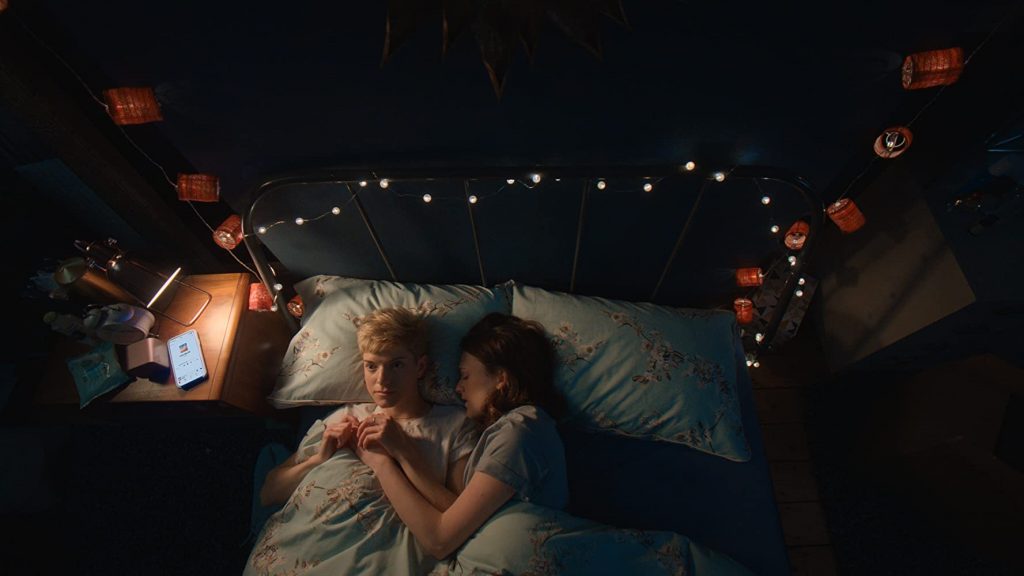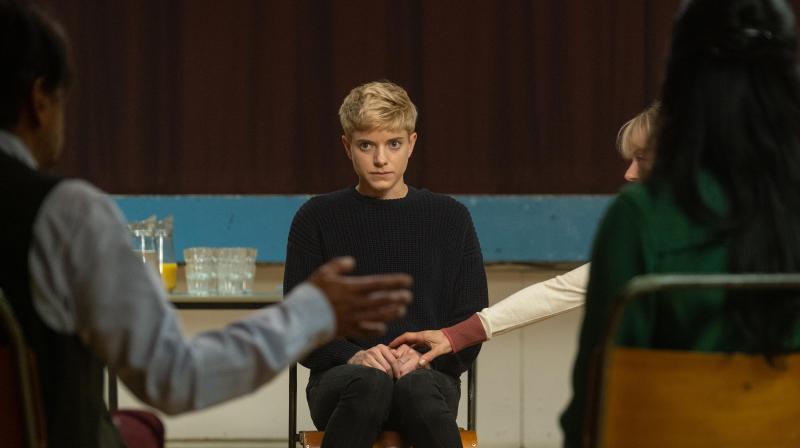By Hannah Ryan
ÔÇÿYou grew up white and rich and straight and hot. You basically won the lottery!’ These are the words hurled by Mae Martin (as she plays a quasi-fictional version of herself) at Charlotte Richie’s George, her closeted girlfriend, in a fit of equal fury and hurt at Feel Good‘s midway point. For any queer woman out there that’s ever found themselves in a relationship with a George ÔÇô someone that hasn’t been in love with another woman before and who isn’t necessarily forthcoming on the importance of introducing your partner to your friends and family ÔÇô Mae’s words feel particularly loud.
Channel 4’s Feel Good is the story of a life, of a specific kind of life, lived by a woman who treats her relationships and substance abuse as one and the same ÔÇô spaces in which she can place feelings of intensity, ecstasy and extremity. Mae is the epitome of all that many young LGBT+ folk feel in the 21st century: She grasps at love as if it is often guilty of slipping away, of escaping her, at all times in the way that so many of us do, as we live in fear that we won’t be able to find it again as easily as our heterosexual friends will. Mae knows ÔÇô better than any of us, it often seems ÔÇô how much it feels like us young LGBT+ adults will only be given one shot at holding onto a love. For many of us, learning to process and live with the inherent trauma that comes with growing up gay is enough of a challenge in itself ÔÇô by the time we’ve come to terms with that, many of our straight friends have already met and fallen in love with someone that they’re like to spend the rest of their life with. For us, our twenties threaten to play out as a delayed adolescence where relationships are coloured by teen-like mutual obsession, grandiose acts and turbulence. Feel Good inhabits a space that reflects this phenomenon, where the specific shared experiences of young queer women are lived out before us by Mae in rip-roaring fashion.
As well as suffering from perpetual lovesickness, Mae is also a recovering drug addict. Narcotics Anonymous is not exactly the place for her, she doesn’t think, but it is there that she meets her sponsor Maggie (a wonderfully funny Sophie Thompson), who becomes the bohemian Daedalus to Mae’s Icarus when she flies a little too close to the sun. As Mae’s wings look as though they might start melting as she approaches a spiral following George’s reluctancy to tell the people in her life about her relationship, Maggie tells her what a great deal of us queer folks already know ÔÇô that Mae is simply swapping one addiction for another; trading in her substance use for an all-consuming romance. It is no secret that drug and alcohol abuse can be particularly rife amongst members of the LGBTQ+ community. For many of us, including myself, substances serve as an essential part of the self-medication we administer to ourselves in an attempt to nurse the inherent hurt that comes with closeting and the shame that it can take years to detach from our identities. Drugs, for plenty of young queer identities, are synonymous with escape and with the ability to slip into another dimension ÔÇô one where we don’t have to confront the internalised frustration our sexualities can trigger and where we can delve into them without fear of real world repercussions. It is only when Mae faces a resurgence of embarrassment surrounding her sexuality that she finds herself returning to the comfort of drug use. Throughout the series, Mae’s relationship with substance abuse reveals itself as being rooted in a desire to cope with her identity when she encounters obstacles specific to queerness.
Of all the themes at the heart of Feel Good ÔÇô and, oh, there are many ÔÇô the complexities that can arise from falling for someone that isn’t yet at the same point as you in your journey with queerness is the one that seems to sneak up the most on many gay women and suddenly announces itself as the most familiar issue of them all. Shortly after Mae and George meet and begin a relationship, it becomes increasingly clear that George’s lack of experience in love with other women ÔÇô and her tendency to convince her friends that Mae is not Mae but, rather, a boyfriend with the strangely specific name of Jonathan Crenshaw ÔÇô threatens to turn into a bone of contention. It isn’t that George doesn’t love Mae. In fact, she is so overwhelmingly in love that she is willing to spend ┬ú300 on a surprisingly realistic policewoman’s uniform just to rescue their sex life. It isn’t a question of love, rather, it is the very real fear in George’s mind of alienating her loved ones by telling them she has a girlfriend. None of this is George’s fault and yet anyone that has been in Mae’s position, in which you’ve spent years in and out of relationships with other women and suddenly find yourself wrapped up with someone that hasn’t had anywhere near as much exposure to queer culture as you have, can recognise her frustrations. Sometimes, love isn’t quite enough to distract from the fact that you and your partner are operating at vastly different stages in your navigation of sexuality. That doesn’t mean, however, that the relationship is reductive or the love is less significant than any other.
In the case of Mae and George, their love exists in a league of its own. What it does mean is that dating someone still grappling with the closet, when you stepped out of your own long ago, can steer you into choppy and uncharted waters. And there lies the appeal of Feel Good ÔÇô it is an invitation to wade your way through the seas of queerness alongside Mae as she, George and those around them try and do their best to survive in a world that isn’t always designed to handle addiction or gayness, nor anything in between. All any of us are really trying to do, Mae reminds us, is cope.




